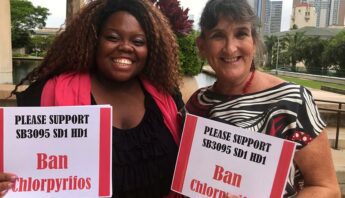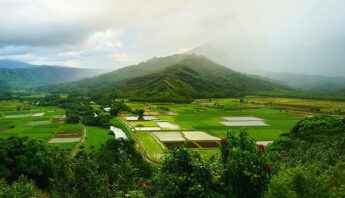For Immediate Release: May 2, 2018
Honolulu, Hawaiʻi – Late yesterday, the Hawaiʻi legislature passed a bill that would ban chlorpyrifos, a neurotoxic pesticide known to harm children’s developing brains. The Trump Administration reversed course on a planned ban of chlorpyrifos just over a year ago.
The bill, SB 3095, includes several other protections from and disclosures around pesticides that can harm children, including buffer zones around schools. The bill now heads to the Governor David Ige who can sign the bill into law or veto it.
“People across Hawaiʻi celebrated a victory and dealt a blow to pesticide corporations yesterday with the passage of SB 3095,” said PAN Honolulu-based policy fellow, Leslee Matthews. “Since colonization, people on Hawaiʻi have fought for a food system that respects the health of families, communities and the environment. When the Governor signs this law, our keiki will be better protected from the brain-harming pesticide chlorpyrifos, and the state can better monitor activities of pesticide corporations on the islands.”
As global competition pushed out other crops in the last few decades, a handful of pesticide and seed corporations have begun testing and growing commodity seed crops on the islands, primarily for export. Alongside those efforts, concerning pesticide use has become rampant.
SB 3095 survived a contentious legislative session and would be the first in the country to ban chlorpyrifos, a pesticide U.S. Environmental Protection Agency (EPA) Administrator Scott Pruitt reneged on plans to ban as one of his first actions in March of 2017. Pruitt’s controversial decision flouted the recommendations of EPA’s own scientists.
“This victory was hard-fought,” continued Matthews. “Communities fought for and won basic protections through the passage of county ordinances and initiatives, only to see their concerns cast away by the courts. The passage of this legislation is a recognition of the principles of democracy and community voices.”
The Maryland legislature failed to pass a bill to ban chlorpyrifos earlier this year, and California regulators are still deliberating. A bill has also been introduced in New Jersey. Other pieces of the Hawaiʻi bill, including mandatory disclosure of restricted use pesticides, no-spray zones around schools and pesticide drift monitoring, are consistent with policies first adopted at county councils on neighbor islands.
“I really want to thank those folks in the community who have time and again stepped up to the plate to make their voices heard,” said representative Chris Lee (Dist. 51 – Kailua, Waimanalo) in a statement on the House floor. “More than anything, what this bill demonstrates is that people getting involved can make a difference.”
Press Contacts:
Leslee Matthews, leslee@panna.org or 817-988-7001
Paul Towers, ptowers@panna.org or 916-216-1082







